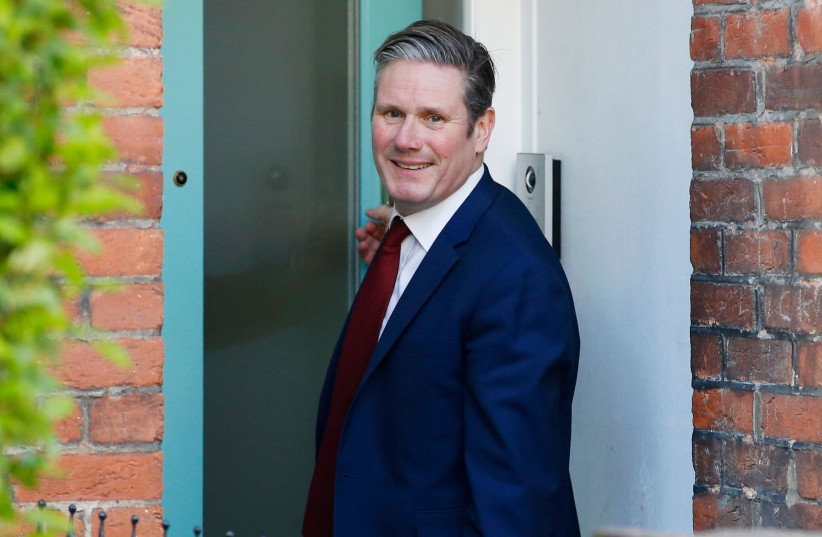As many as a dozen candidates were on Friday eyeing up replacing Boris Johnson as British prime minister after he was forced to quit by his own party, with opponents saying they want him out of Downing Street immediately.
Johnson said on Thursday that he would step down as Conservative Party leader and British premier following resignations by more than 50 government ministers, and many of his lawmakers telling him they wanted him gone.
The jostling to choose his successor - a process that could take weeks or even months - is underway with senior figures and some lesser-known members of parliament (MPs) expected to throw their hats in the ring.
Former British finance minister Rishi Sunak said on Friday he was running to replace Johnson, saying the UK has "had enough of division" and that he aims to "take Britain in the right direction."
In the meantime, Johnson, brought down by a series of scandals and a loss of trust in his integrity, remains in the job, a situation that opponents, and many in his own party, say is untenable.

UK Labour say will pursue election through vote of no confidence
The leader of the British opposition Labour Party on Friday said that he would move to bring about a national election using a vote of confidence in Prime Minister Boris Johnson next week unless Conservative lawmakers acted to remove him earlier.
Asked if he was pushing for a vote of no confidence next week to trigger a general election, Starmer said "yes" and said that Conservative lawmakers should remove Johnson now rather than waiting for the next permanent leader.
"The duty is on the Conservative Party to do the right thing, and obviously there are meetings early next week with the '22 committee. So it's for them to do the right thing," Starmer told a news conference. "If they don't we will step up with a vote of no confidence."
Johnson pledged not to make any big changes of direction that would tie the hands of his successor.
"Essentially the government will focus on delivering on pre-agreed policy, delivering on manifesto commitments, it won't seek to make any large fiscal changes nor will it seek to unpick previously agreed policy," his spokesman told reporters.
Replacing Johnson a matter of "national interest"
Johnson, who less than three years ago won an election with a large majority, was brought down by scandals that included breaches of COVID-19 pandemic lockdown rules, a luxury renovation of his official residence and the appointment of a minister who had been accused of sexual misconduct.
In his speech to the country announcing his exit, Johnson did not use the word 'resign' or 'resignation', and described his forced departure as "eccentric," and such is the lingering distrust in his behavior that former Conservative prime minister John Major said Johnson should leave now.
"To allow a prime minister whose own ministers have just resigned en masse with no confidence in his leadership to remain in place cannot be in the national interest," the Times newspaper said in its editorial.
An ally of the prime minister denied claims that Johnson was only staying on because he wanted to throw a party at his official Chequers country residence to celebrate his wedding to wife Carrie. The venue for the party later this month has now changed.
Meanwhile, many Conservatives are turning their attention to replacing him full-time, with no shortage of ambitious candidates.
So far just Attorney General Suella Braverman and Tom Tugendhat, chairman of parliament's Foreign Affairs Select Committee, have officially confirmed their desire to be the next leader, but about a dozen others have been tipped to consider running for the job.
Among those who are considered to be front runners are former finance minister Rishi Sunak, foreign minister Liz Truss and defense minister Ben Wallace, although none of them have as yet declared their intention to stand.
Although the exact rules and timetable for the contest have yet to be set out, Conservative lawmakers will whittle down the hopefuls to a final two candidates, and then the party's members - numbering fewer than 200,000 people - will decide which one will be leader, and the next prime minister.
Whoever that is will be faced with a daunting in-tray.
Boris quits as UK economy crumbles
Britain's economy is facing rocketing inflation, high debt, and low growth, with people coping with the tightest squeeze on their finances in decades, all set against a backdrop of an energy crunch exacerbated by the war in Ukraine which has sent fuel prices soaring.
There is also growing industrial unrest with widespread strikes by rail workers, while others including teachers and healthcare staff also threatening walkouts.
Despite his 2019 election triumph being based on his promise to "get Brexit done," Britain remains in a bitter standoff with the European Union over trade rules for Northern Ireland.
"Whatever the party decides to do next, it needs to do it quickly," the Daily Telegraph newspaper said in its editorial. "The country will not understand or forgive a protracted leadership contest in the middle of an economic crisis and with a threat of a wider war in Europe ever-present."
